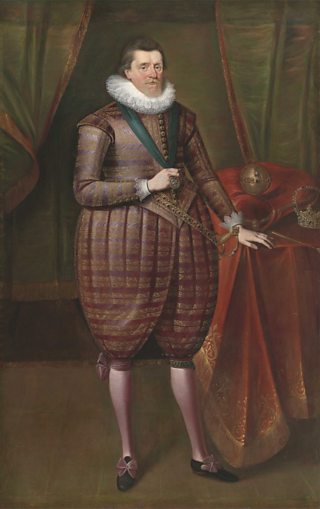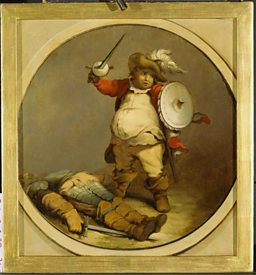A magnet for Lincolnshire entertainers, royalty and even Shakespeare himself?
Belvoir Castle in Leicestershire, near Grantham in Lincolnshire was a 17th Century destination point where royalty, entertainers and, frankly, everyone who was anybody, would head.
-
![]()
Much ado near me
Hear more Shakespeare stories on BBC Radio Lincolnshire
-
![]()
Shakespeare Festival 2016
The BBC celebrates the genius of the bard

We know for a fact that King James visited Belvoir Castle twice (between 1603 and 1612) and records show that when there was a royal visit, every important person in Lincolnshire appears to have made his or her way there.

Belvoir castle was the home of the Duke of Rutland, near the Lincolnshire border.
Records of the Duke's household show that he brought in the entertainers whenever the King came to visit. And we know from other royal visits that Shakespeare’s company was sometimes with the King during royal visits to his provinces.
We cannot say for certain that that was the case here – although there is a tantalising possibility, there is no hard evidence! James Stokes, Suffolk editor from the Records of Early English Drama, comments: “It seems entirely reasonable to me to think that Shakespeare’s company might have been present when the King visited Belvoir.”
We can say, though, that here is a further connection between Shakespeare and the Duke.
Shakespeare on Tour
From the moment they were written through to the present day, Shakespeare’s plays have continued to enthral and inspire audiences. They’ve been performed in venues big and small – including inns, private houses and emerging provincial theatres.

BBC English Regions is building a digital picture which tracks some of the many iconic moments across the country as we follow the ‘explosion’ in the performance of The Bard’s plays, from his own lifetime to recent times.
Drawing on fascinating new research from Records of Early English Drama (REED), plus the British Library's extensive collection of playbills, as well as expertise from De Montfort University and the Arts and Humanities Research Council, Shakespeare on Tour is a unique timeline of iconic moments of those performances, starting with his own troupe of actors, to highlights from more recent times. Listen out for stories on Shakespeare’s legacy on your BBC Local Radio station from Monday 21 March, 2016.
You never know - you might find evidence of Shakespeare’s footsteps close to home…
Craig Henderson, BBC English Regions
On 31 March 1613, the year Shakespeare retired, the Duke of Rutland paid "Mr. Shakespeare" 44 shillings in gold for an impresso for the Earl, and paid "Richard Burbage" 4 pounds 8 shillings in gold for painting and making the impresso.
The transaction no doubt occurred in London in connection with the tilts.
Lincolnshire Bagpipes
The pipes are famously mentioned by the character Falstaff in which he likens his melancholy to their sound:
I am as melancholy as a gib cat or a lugged bear...Yea, or the drone of a Lincolnshire bagpipe.Falstaff (Henry IV Part 1)
"I am as melancholy as a gib cat or a lugged bear...Yea, or the drone of a Lincolnshire bagpipe."
- Falstaff (Henry IV Part 1)
Records from the time show that there were many payments made to musicians, including pipers from Lincolnshire.

Tilts explained
By James Stokes, Suffolk editor from the Records of Early English Drama
Tilts were chivalric jousting done in a tiltyard (a sort of a purpose-built corral, so to speak) with spectators. It was a form descended from true tournaments, and was popular at the court of James I. It was entertainment, a contest between two individuals, either on foot or on horseback, but it was still dangerous.
An impresso was an imprint of some kind, a design, that could be affixed or bonded to something, either a banner or a shield in this case. Perhaps it was the Manners family (Duke of Rutland’s) crest or a coat of arms. It was prepared for the Duke personally.
Banners or crests and shields, etc., would have been a big part of the battles represented on stage - a part of the stagecraft of Shakespeare's theatre - so it is not surprising that the Duke called upon Shakespeare and Burbage. (It is interesting that Shakespeare is called "Mr." while Burbage is just called Richard Burbage. Shows something about Shakespeare's stature, I think.)
While the transaction happened, we think, in London it does show that Manners (the Duke of Rutland) and Shakespeare knew each other and that Shakespeare had done him a service.
Shakespeare's company of players would certainly have received a warm welcome at Belvoir.
-
![]()
Shakespeare Lives
The nation’s greatest performing arts institutions mark 400 years since the Bard's death
Related Links
Shakespeare on Tour: Around Lincolnshire
-
![]()
Shakespeare is the star in Stamford
The playwright's own life is turned into a drama
-
![]()
Lincolnshire's early Shakespeare performances
British library playbills show how Shakespeare reached Lincolnshire villages
Shakespeare on Tour: Around the country
-
![]()
The 1809 ticket price riots
The most famous riots in the history of theatre
-
![]()
Cambridge students put on a Christmas satire
Shakespearean style 'Footlights'
-
![]()
North West's influence on Shakespeare's success
Plus, the small Cheshire town that attracted Shakespeare's players
-
![]()
Salisbury shadows play Shakespeare
A dreamy performance of Shakespeare









